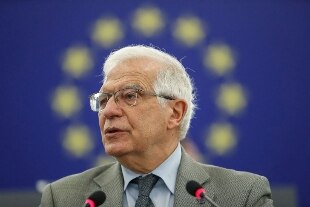The EU launches a new strategy on Russia based on deterrence and dialogue. "In the current circumstances, a renewed partnership between the EU and Russia, allowing for closer cooperation, seems a distant prospect". This was stated by EU High Representative Josep Borrell. "Our ambition should be to explore paths that could help change the current dynamics gradually into a more predictable and stable relationship - he adds -. The EU is committed to rejecting, containing and interacting with Russia on the basis of a common understanding. Russian objectives with a pragmatic approach ". "To counter Russian attacks on EU interests, the Union must become more robust and resilient".The new EU strategy towards Russia provides for a commitment to "contain the threats and harmful actions" of Moscow in a systematic and joint manner with partners such as NATO and the G7 ", according to a note from the European Commission. 'The EU will therefore have to "further develop its cyber security and defense capabilities and strengthen responsiveness to hybrid threats by leveraging energy exchange", the note continues. Another key word is "reject", with the EU pledges to "reject violations of human rights by becoming the spokesperson for the values of democracy in international fora". The high representative of the EU Josep Borrell indicated as an important part of this step "support forUkraine and its sovereignty and independence by calling on Russia to assume its responsibilities as a party to the conflict and to fully implement the Minsk agreements. "The third point of the new EU strategy towards Russia is" to contain ". The document proposed by Borrell provides finally to "interact with Moscow on key global challenges. The Covid-19 pandemic has indicated interest in a common commitment on public health, furthermore the fight against climate change and environmental issues require a closer dialogue with Russia in the framework of the United Nations, Cop-26 and Cop -15 ". The new strategy also provides for a" technical collaboration with the Russian government on trade, exploiting the competitive advantages of the EU ".The EU also intends to foster interpersonal contacts "by facilitating the visa system, and also by strengthening its support for Russian civil society and human rights activists". An important element will also be "cooperation in the Northern Dimension, in the Arctic, on conflict prevention and on regional and global issues, such as Iran, the Middle East and Afghanistan, on counter-terrorism and the non-proliferation of arms".Middle East and Afghanistan, on counter-terrorism and the non-proliferation of weapons ".Middle East and Afghanistan, on counter-terrorism and the non-proliferation of weapons ".
Share
June 16, 2021 - EU launches new strategy on Russia based on deterrence and dialogue.
"In the current circumstances, a renewed partnership between the EU and Russia, allowing for closer cooperation, seems a distant prospect".
This was stated by EU High Representative Josep Borrell.
"Our ambition should be to explore paths that could help change the current dynamics gradually into a more predictable and stable relationship - he adds -. The EU is committed to rejecting, containing and interacting with Russia on the basis of a common understanding. Russian objectives with a pragmatic approach ".
"To counter Russian attacks on EU interests, the Union must become more robust and resilient". The new EU strategy towards Russia provides for a commitment to "contain the threats and harmful actions" of Moscow in a systematic and joint manner with partners such as NATO and the G7 ", according to a note from the European Commission.
The EU will therefore have to "further develop its cyber security and defense capabilities and strengthen responsiveness to hybrid threats by leveraging energy exchange", the note continues. Another key word is "reject", with the EU committing itself to "reject violations of human rights by becoming the spokesperson for the values of democracy in international fora". EU High Representative Josep Borrell indicated as an important part of this step "support for Ukraine and its sovereignty and independence by inviting Russia to assume its responsibilities as part of the conflict and to fully implement the Minsk agreements". The third point of the new EU strategy towards Russia is to "contain".Finally, the document proposed by Borrell plans to "interact with Moscow on key global challenges. The Covid-19 pandemic has indicated interest in a common commitment to public health, and the fight against climate change and environmental issues require dialogue closer with Russia in the framework of the United Nations, Cop-26 and Cop-15 ".
The new strategy also provides for a "technical collaboration with the Russian government on trade, exploiting the competitive advantages of the EU".
The EU also intends to foster interpersonal contacts "by facilitating the visa system, and also by strengthening its support for Russian civil society and human rights activists". An important element will also be "cooperation in the Northern Dimension, in the Arctic, on conflict prevention and on regional and global issues, such as Iran, the Middle East and Afghanistan, on counter-terrorism and the non-proliferation of arms".

